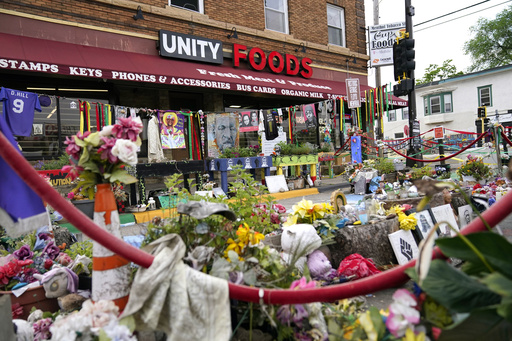
MINNEAPOLIS — Business owners situated at the site of George Floyd’s tragic death, a consequence of police action in 2020, are pursuing legal action against the City of Minneapolis. They seek government intervention in managing their properties and fair compensation for their losses.
The proprietors of Cup Foods and other nearby enterprises located at the intersection of 38th Street and Chicago Avenue assert that the city’s negligence in addressing ongoing crime and urban decay has severely impacted their businesses, constituting an unlawful seizure of their properties without adequate compensation. As detailed in reports, they are requesting $30 million in damages.
This area, now referred to as George Floyd Square, has evolved into a significant site for those advocating for social justice nationwide, prompting Cup Foods to rebrand itself as Unity Foods. However, local business owners claim they have not reaped any benefits from this transformation, while debates among activists and city officials continue regarding how best to honor Floyd’s memory in this space while also revitalizing the neighborhood.
Floyd’s death occurred when a police officer maintained his knee on Floyd’s neck for over nine minutes, despite Floyd’s pleas for relief. This sparked widespread protests, some of which escalated into violence, placing considerable strain on Governor Tim Walz and prompting a national dialogue about racism and police practices. The officer involved, Derek Chauvin, was later convicted of murder.
The recent lawsuit, submitted to Hennepin County District Court last week, contends that the businesses have suffered significant financial setbacks, including diminished revenue, loss of property value, and negative impacts on their reputation and rental income opportunities. It claims that the city’s actions contributed to an increase in crime, effectively turning the area into a “no go zone” for law enforcement. This legal effort replaces a previous lawsuit by the same businesses that was dismissed two months ago.
Attorney Michael Healey, who represents the involved businesses, elaborated on the potential outcomes of their legal pursuit. He noted that there are two primary scenarios: either the businesses could retain ownership of their properties if a settlement is reached with the city over reduced valuation, or the city could initiate a process to acquire the properties and provide the owners with compensation.
In response, a city representative provided a statement indicating an understanding of the difficulties faced by community members and businesses following the events surrounding George Floyd’s death, although specifics about the ongoing litigation could not be disclosed.
